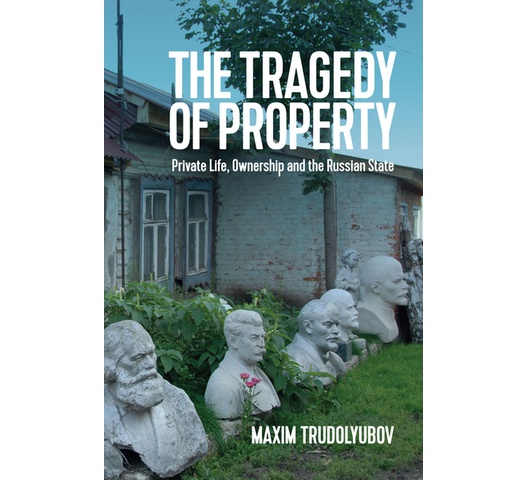
The Tragedy of Property
This is an eBook that you can download electronically.
Russian novels, poetry and ballet put the country squarely in the European family of cultures and yet there is something different about this country, especially in terms of its political culture. What makes Russia different?
Maxim Trudolyubov uses private property as a lens to highlight the most important features that distinguish Russia as a political culture. In many Western societies, private property has acted as the private individual’s bulwark against the state; in Russia, by contrast, it has mostly been used by the authorities as a governance tool. Nineteenth-century Russian liberals did not consider property rights to be one of the civil causes worthy of defending. Property was associated with serfdom, and even after the emancipation of the serfs the institution of property was still seen as an attribute of retrograde aristocracy and oppressive government. It was something to be destroyed – and indeed it was, in 1917.
Ironically, it was the Soviet Union that, with the arrival of mass housing in the 1960s, gave the concept of private ownership a good name. After forced collectivization and mass urbanization, people were yearning for a space of their own. The collapse of the Soviet ideology allowed property to be called property, but not all properties were equal. You could own a flat but not an oil company, which could be property on paper but not in reality. This is why most Russian entrepreneurs register their businesses in offshore jurisdictions and park their money abroad.
This fresh and highly original perspective on Russian history will be of great interest to anyone who wants to understand Russia today.
SKU: 9781509527045
Format: EPUB
Maxim Trudolyubov uses private property as a lens to highlight the most important features that distinguish Russia as a political culture. In many Western societies, private property has acted as the private individual’s bulwark against the state; in Russia, by contrast, it has mostly been used by the authorities as a governance tool. Nineteenth-century Russian liberals did not consider property rights to be one of the civil causes worthy of defending. Property was associated with serfdom, and even after the emancipation of the serfs the institution of property was still seen as an attribute of retrograde aristocracy and oppressive government. It was something to be destroyed – and indeed it was, in 1917.
Ironically, it was the Soviet Union that, with the arrival of mass housing in the 1960s, gave the concept of private ownership a good name. After forced collectivization and mass urbanization, people were yearning for a space of their own. The collapse of the Soviet ideology allowed property to be called property, but not all properties were equal. You could own a flat but not an oil company, which could be property on paper but not in reality. This is why most Russian entrepreneurs register their businesses in offshore jurisdictions and park their money abroad.
This fresh and highly original perspective on Russian history will be of great interest to anyone who wants to understand Russia today.
KES 3,757

International delivery
Free click & collect
When you buy an ebook from TBC, you will be given a code to download your
purchase from our ebook partner Snapplify. After you have redeemed the code and
associated it with a Snapplify account, you'll need to download the Snapplify Reader
to read your ebooks. The free Snapplify Reader app works across iOS, Android,
Chrome OS, Windows and macOS; on tablets and mobile devices, as well as on
desktop PCs and Apple Macs.
You're currently browsing Text Book Centre's digital books site. To browse our range of physical books as well as a wide selection of stationery, art supplies, electronics and more, visit our main site at textbookcentre.com!
Reviews
This product does not have any reviews yet.
Add your review
